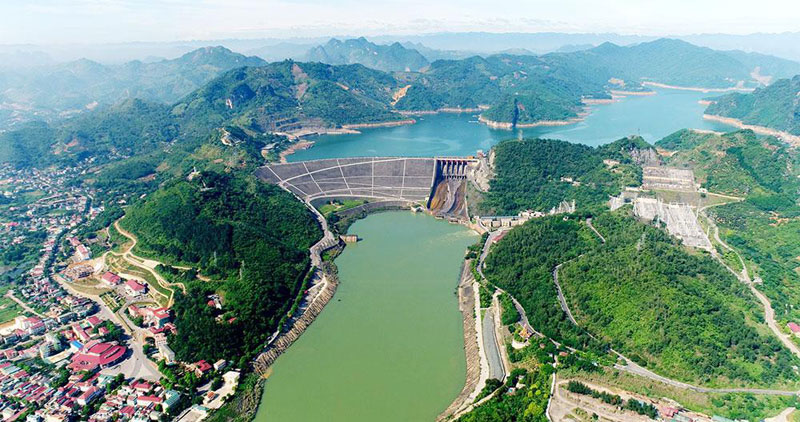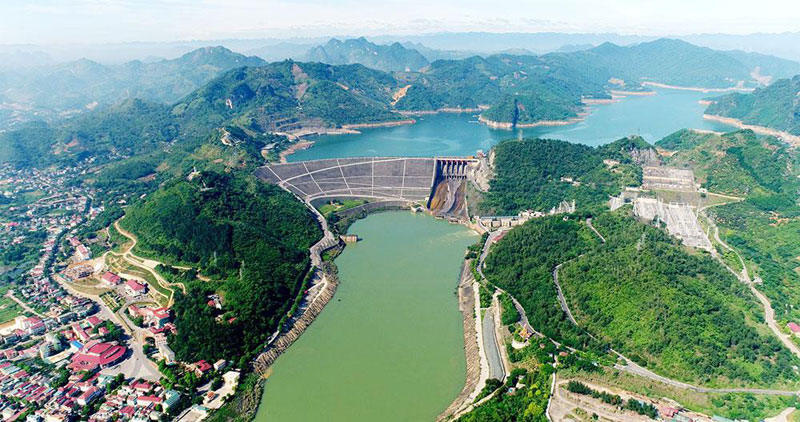
(HBO) – Last year, the Hoa Binh hydropower plant produced nearly 8.35 billion kWh of electricity, up just 0.2 percent compared to the adjusted plan and equivalent to 87.53 percent of the initial plan due to drought and low water flow iton the Hoa Binh reservoir
 In 2019, the total
water volume flowing into the Hoa Binh reservoir stood at only 37.2 billion
cu.m, equivalent to 68.6 percent of the yearly average.
In 2019, the total
water volume flowing into the Hoa Binh reservoir stood at only 37.2 billion
cu.m, equivalent to 68.6 percent of the yearly average.
Leaders of the Hoa
Binh Hydropower Company said that in 2019, the total water volume flowing into the
Hoa Binh reservoir stood at only 37.2 billion cu.m, equivalent to 68.6 percent
of the average level in many years. The rainy season saw only one flood spell, with
the water peak volume of 7,700 cu.m per second in early August, but it lasted for
a very short time.
From June until the
end of 2019, the reservoir faced severe water shortage, even in the rainy
season (from July to September), during which the water level only reached half
of the yearly average level in many years.
At the end of
the year, the level was measured at 102 m, which was 10 metres lower than the same
period of 2018 and 15 metres lower than the average level. The electricity
generation could not meet the initial plan, leading to a 300 billion VND (12.9
million USD) deficit in Hoa Binh’s State budget collection contributed by the
Hoa Binh hydropower plant.
Forecast showed
that hydrology in the first half of 2020 would worsen due to drought and low
water levels in reservoirs, causing difficulties for electricity generation and
water supply for the lower regions.
The Hoa Binh Hydropower
Company has launched measures and strived to fulfil the assigned target of
nearly 8.26 billion kWh, as well as maintain the water level in the reservoir
at around 116 m at the end of the year.
To meet the
targets, the company will work with relevant agencies to keep a close watch on the
hydrological situation and devise a suitable water management plan for electricity
generation, flood and drought prevention.
It also needs to
effectively carry out plans for disaster mitigation and search and rescue in
the year, join hands with relevant parties in arranging suitable operation mode
of turbines in permitted capacity to ensure stable operations, as well as
maintain a minimum flow in the dry season./.
According to data from the Hoa Binh Provincial Party Committee, the industrial production index for the first six months of 2025 is estimated to have increased by 20% compared to the same period last year. This marks the highest year-on-year growth rate for this period since 2020.
In the first six months of 2025, Hoa Binh province’s export turnover was estimated at 1.145 billion USD, marking an 18.11% increase compared to the same period in 2024. Import turnover was estimated at $ 804 million, a 17.15% increase, which helped the province maintain a positive trade balance.
The lives of the ethnic minority farmers in Tan Lac district have gradually improved thanks to the new directions in agricultural production. This is a testament to the collective strength fostered through the professional associations and groups implemented by various levels of the district’s Farmers’ Union.
With the motto the "product quality comes first,” after nearly one year of establishment and operation, Muong village’s Clean Food Agricultural and Commercial Cooperative, located in Cau Hamlet, Hung Son Commune (Kim Boi district), has launched reputable, high-quality agricultural products to the market that are well-received by consumers. The products such as Muong village’s pork sausage, salt-cured chicken, and salt-cured pork hocks have gradually carved out a place in the market and they are on the path to obtaining the OCOP certification.
In the past, the phrase "bumper harvest, rock-bottom prices" was a familiar refrain for Vietnamese farmers engaged in fragmented, small-scale agriculture. But today, a new spirit is emerging across rural areas of Hoa Binh province - one of collaboration, organisation, and collective economic models that provide a stable foundation for production.
Maintaining growing area codes and packing facility codes in accordance with regulations is a mandatory requirement for agricultural products to be eligible for export. Recently, the Department of Agriculture and Environment of Hoa Binh province has intensified technical supervision of designated farming areas and packing facilities to safeguard the "green passport" that enables its products to access international markets.



 In 2019, the total
water volume flowing into the Hoa Binh reservoir stood at only 37.2 billion
cu.m, equivalent to 68.6 percent of the yearly average.
In 2019, the total
water volume flowing into the Hoa Binh reservoir stood at only 37.2 billion
cu.m, equivalent to 68.6 percent of the yearly average.